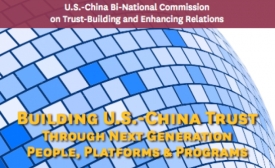united states
For nearly six decades, South Korea's (ROK) approach to security has focused on sustaining the status quo: Maintaining deterrence and a robust defence posture in order to prevent another major conflict on the Korean Peninsula.
Americans like to associate their spam with other countries. They joke about Chinese spammers or Nigerians or Russians. It's a time-honored nativist tradition. But, according to the new quarterly report from the security and spam monitoring company, Sophos, computers inside these United States relay—by far—the most spam. And we have in every quarter of the past year.

The U.S.-China Bi-National Commission releases its first major report: Building U.S.-China Trust Through Next Generation People, Platforms, and Programs.
Tuberculosis (TB) is an airborne, infectious disease that infected 8.6 million people and killed approximately 1.3 million worldwide in 2012. UNAIDS has summed up this situation by concluding “TB anywhere is a threat everywhere.”
The soft-power age has almost ended. The key players of global politics no longer use their soft power to influence other states, nor the general route of international politics. Worse, there are not many actors with the ability to perform decisively at the international level.
Even as the crisis inUkraine continues to defy easy resolution, President Obama and his national security team are looking beyond the immediate conflict to forge a new long-term approach to Russiathat applies an updated version of the Cold War strategy of containment.
As languages go, English is a notoriously promiscuous one, borrowing caricatures from Italian, chutzpah from Yiddish and faux pas from French. And yet despite the English-speaking world’s deep and wide confluences with Chinese culture, for some reason, few Chinese words have lately entered the English-speaking world’s vocabulary.
Sen. Ted Cruz’s bill to forbid an Iranian diplomat from entering the U.S. got President Barack Obama’s signature Friday, though the president noted he still considers the law “advisory.” The law spearheaded by the typically polarizing Texas Republican was a rare moment of consensus in D.C.: Obama’s sign-off follows unanimous passage in the Senate and House last week.







